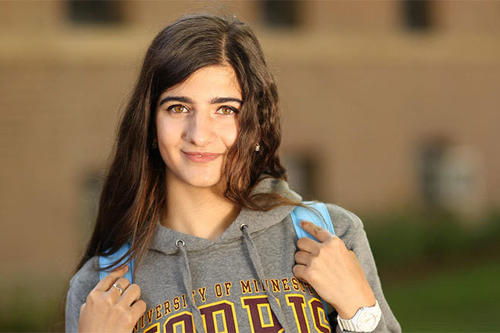
It was a bit of an accident that Esmira Alieva ’19 (Samarkand, Uzbekistan) ended up at the University of Minnesota Morris. Her parents were worried about sending her to school in a foreign country, but since she had an uncle who lived in the Twin Cities, she applied understanding that she’d live with him.
“He said the University of Minnesota was really close,” she says.
“My application came back and I had been accepted to the U of M, but when we checked the [Morris] address it was three hours away from my uncle (laughs). Back home we don’t have a system of campuses,” she explained.
Although her parents were hesitant to let her to go it alone, she was determined.
More than three years later, she doesn’t regret a thing.
Building relationships
When Alieva arrived in January of 2016, she was the only student at Morris from Uzbekistan, and one of just a handful of Muslim students, so she immediately took steps to become more comfortable. For her, that meant joining multiple committees and student groups, organizing food drives and fundraisers, and even becoming a residential adviser.
During that process she noticed something about the culture.
“Sometimes it seems that we are a little bit divided. International students hang out with international students. Athletes hang out with athletes. I wanted to break that division and build a more engaged community,” she says.
So Alieva helped create the Muslim Students Association. The group, which consists of about a dozen members, does outreach in classrooms and has conversations with students and community members.
One of the group’s larger accomplishments came from working with the Morris College Republicans and other student organizations, which, as she says, “normally struggle to work with each other,” to create a 9/11 memorial to honor those lost in the tragedy.
The groups set up a massive circle of 4,000 flags on campus, with American flags in the center and then radiating outward to flags of the more than 90 countries, including Uzbekistan, that lost citizens in the attacks.
“It was a challenge because campus is in some ways very united, and very divided when it comes, for example, to liberals and conservatives. But this event was a project that we could work on together—to honor the lives that we lost on that day.”
In the spring of 2019, Alieva was recognized for her work in bringing students together with the Josef Mestenhauser Student Award for Excellence in Campus Internationalization.
An economics and management double major, Alieva will graduate this fall and hopes to someday work for the United Nations.
- Categories:
- Law and Policy





